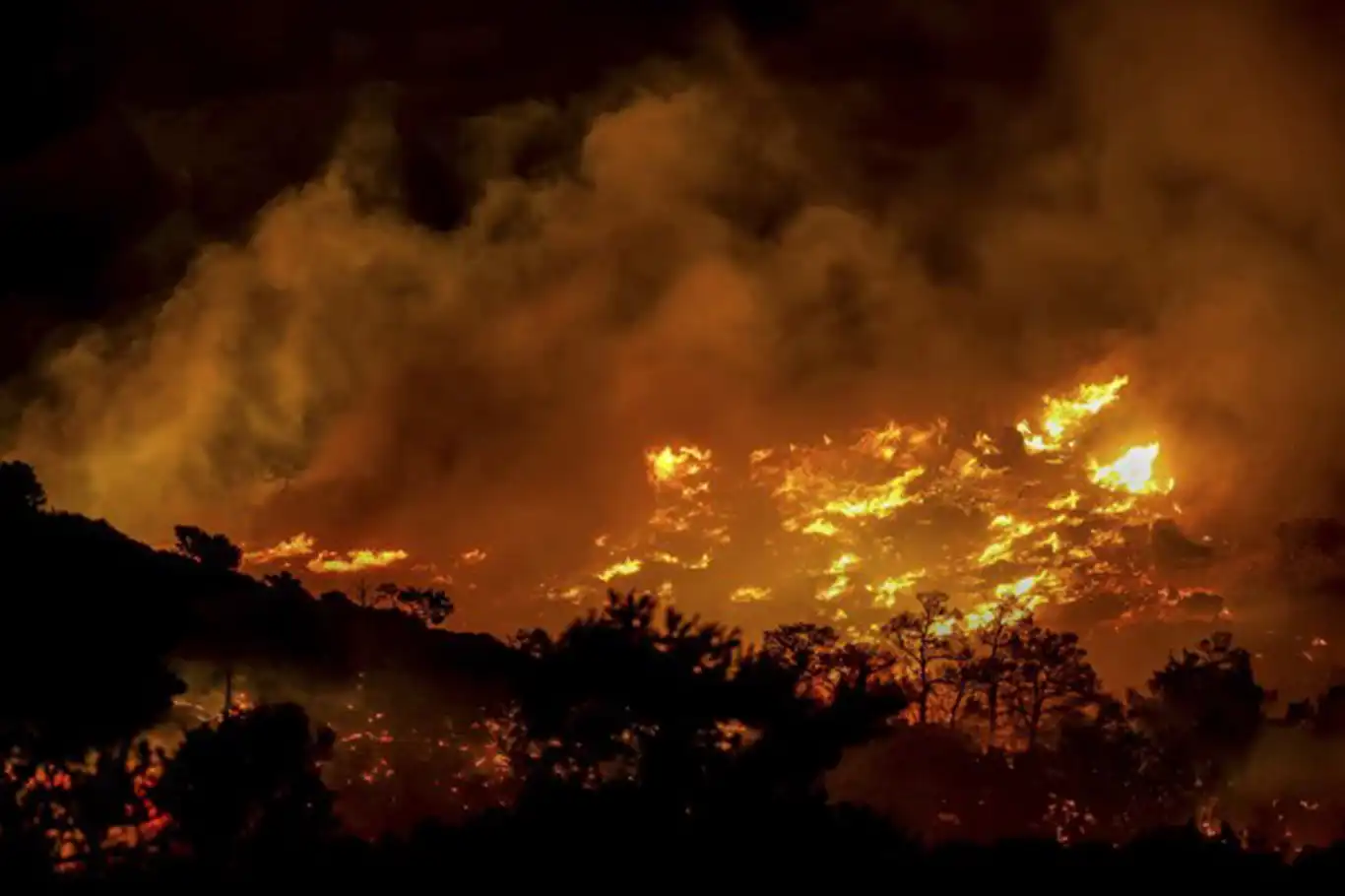Wildfires engulf Greece: One dead, hundreds rescued near Athens


A ferocious wildfire, believed to have been sparked by arson, continued to burn southeast of Athens on Saturday, fueled by gale-force winds that have complicated firefighting efforts.
The blaze, located approximately 35 kilometers from the Greek capital in the rural area of Keratea, has prompted mass evacuations and caused significant destruction, with one fatality reported so far.
According to local authorities, the fire began on Friday, August 8, and was allegedly ignited deliberately. The mayor of a nearby affected village, speaking to state broadcaster ERT, reported that a gas cylinder was discovered at the fire’s origin point, and residents observed a suspicious individual on a motorbike in the area prior to the outbreak. “This was no accident,” the mayor stated, pointing to evidence of arson as the cause of the catastrophic blaze.
The Greek fire brigade has mobilized a large-scale response, with over 260 firefighters, supported by several firefighting helicopters and planes, working tirelessly since early Saturday morning to contain the fire. While Greek media report that the situation in Keratea is now largely under control, active fire pockets remain, and strong winds of up to 80 kilometers per hour continue to pose a threat.
The blaze has already claimed one life, with the remains of an elderly man found in a burned-out structure near Keratea on Friday. Approximately 400 people have been rescued, and several villages in the region, including an elderly care center, were evacuated as flames encroached. Numerous homes and olive orchards have been reduced to ashes, though the full extent of the damage is still being assessed. Footage from local media showed gutted houses and charred landscapes, underscoring the fire’s devastating impact.
Elsewhere in Greece, the wildfire crisis is escalating, with major blazes reported in central Greece, the northwestern Peloponnese peninsula, and on the islands of Crete, Euboea, and Kythera. In the Peloponnese’s Messinia region, evacuations are underway as fires threaten populated areas, with temperatures soaring to 45.8°C amid a prolonged heatwave. On Euboea, fires have destroyed thousands of hectares of forest and livestock farms, with two fire trucks lost and five firefighters hospitalized with minor injuries. In Crete, a blaze in the Chania region has been brought under control after destroying four homes, a church, and agricultural land, but firefighters remain vigilant.
The Greek Civil Protection Agency has issued a stark warning, classifying the fire risk as “extremely high” across multiple regions, including Attica (the area surrounding Athens), the Peloponnese, Euboea, Crete, the Cyclades, and the Chalkidiki peninsula. These areas are marked red on the agency’s fire risk map, signaling a Category 5 alert due to ongoing drought and persistent strong winds. The agency noted that dry conditions and high temperatures are expected to persist, exacerbating the fire threat through August.
Greece has requested assistance from the European Union through the RescEU mechanism, with six firefighting aircraft and additional units from the Czech Republic and Italy already deployed or en route to support local efforts. “Every resource is being mobilized,” said Prime Minister Kyriakos Mitsotakis, emphasizing the need for international cooperation to combat the climate-driven crisis.
The wildfires come in the wake of a record-breaking heatwave, with temperatures reaching 45.2°C in western Greece on Saturday and little rainfall in recent months. Scientists attribute the increasing frequency and intensity of wildfires in Greece and other Mediterranean countries to climate change, which has turned the region into a “wildfire hotspot.” Calls are growing for enhanced firefighting strategies, including the use of artificial intelligence and satellite monitoring to detect fires early, as well as expanded cross-border collaboration.
On social media platform X, sentiments reflect both concern and frustration. Some users have praised the efficiency of Greece’s Civil Protection teams, noting their success in containing multiple fires despite challenging conditions. Others, however, have raised suspicions of arson, with one user commenting, “Fires don’t just start like this—human activity is to blame.” The debate over arson versus natural causes remains heated, though authorities have not yet confirmed additional arson cases beyond the Keratea incident.
As Greece braces for continued high fire risks, the nation remains on edge, with communities and emergency services working together to protect lives and property. Travelers are urged to stay informed through official channels, including the Greek Ministry for Climate Crisis and Civil Protection’s “112 Greece” emergency app, and to exercise caution in affected areas. (ILKHA)
LEGAL WARNING: All rights of the published news, photos and videos are reserved by İlke Haber Ajansı Basın Yayın San. Trade A.Ş. Under no circumstances can all or part of the news, photos and videos be used without a written contract or subscription.
The Tunisian contingent of the Global Sumud Flotilla, a multinational civilian mission aiming to break Israel’s blockade of Gaza, announced on Sunday that its departure has been postponed by three days due to technical and logistical difficulties.
At least 87 Palestinians were martyred and 409 others injured in the Gaza Strip over the past 24 hours as the Israeli occupation intensified its brutal bombardment, according to local medical sources.
Hospitals across the Gaza Strip confirmed on Sunday that five more Palestinians, including three children, have died within the past 24 hours from famine and severe malnutrition, as the Israeli blockade continues to strangle the besieged territory.
A 4.9-magnitude earthquake shook the Sındırgı district of Balıkesir province on Sunday afternoon, according to the Turkish Disaster and Emergency Management Authority (AFAD).